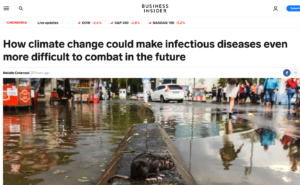Business Insider #ClimateScam propaganda: Trace CO2 might "make pathogens more savvy at surviving in hot climates, and possibly weaken the human body's immune response" https://t.co/n6IBq3hlxx
— Tom Nelson (@tan123) May 3, 2020
By Natalie Colarossi
Excerpt:
According to research from the World Health Organization, and other institutions, the threat of climate change could make outbreaks even worse in the coming decades.
Researchers fear that as temperatures continue to rise, infectious-disease carrying animals could adapt to more widespread climates, pathogens could become stronger at surviving in hotter temperatures, and the human immune system could face greater difficulty in battling illness.
Though the COVID-19 pandemic has not been linked to climate change, here’s how rising global temperatures could lead to an increase in future infectious diseases.
…
As global temperatures continue to rise and create changing weather patterns like increased rainfall, natural disasters, and extreme heat waves, there could be an increase in the ideal environments needed to spread some types of infectious disease.
…
The risk for malaria epidemics can increase five-fold after an El Niño event, a weather pattern that’s expected to get worse with climate change.
…
Researchers fear that as the planet warms, mosquitoes will be able to breed more rapidly and spread disease in typically cooler areas of the world that have otherwise remained unaffected by the pests.
…
Erin Mordecai, a Stanford biologist studying warming climate and infectious disease, warned that “If the climate is becoming more optimal for transmission, it’s going to become harder and harder to do mosquito control.” She added: “It’s coming for you.”
…
Similarly, diseases that are transmitted from animals to humans, such as rats or ticks, have been known to shift depending on climate conditions. Certain rodent-borne diseases are linked to flooding, which is expected to become worse as global temperatures rise.
…
Some researchers believe that weather events play a role in Ebola outbreaks, since dry seasons followed by plentiful rainfall can lead to an increase in fruit production, which could create an environment for animals to feed together and spread the disease.
…
And since climate change is expected to cause an increase in food scarcity, more people in Africa may consume bushmeat, which have been attributed to nearly 50% of Ebola outbreaks in the past.
…
Deforestation could also play a role in the spread of disease. According to the US Agency for International Development, 75% of new or re-emerging diseases at the start of the 21st Century have been transmitted from animals, often because deforestation has brought them closer to human environments.
…
Scientists have also noted that as temperatures continue to rise, animals have begun migrating to typically cooler environments. This could open up new pathways of disease transmission between animals, since more species will likely begin interacting with one another.
…
But an increase in the spread of disease isn’t the only way climate change could impact future epidemics. Warming temperatures might also make our natural immune systems less effective at fighting off pathogens.
immune system
…
But as temperatures warm around the globe, viruses are increasingly getting better at adapting and surviving in hotter environments — including within our bodies.
…
“Imagine that the world is hotter and that lizards adapt to live in temperatures very close to yours. Then their viruses adapt to higher temperatures,” Arturo Casadevall, chair of molecular microbiology and immunology at the Johns Hopkins Bloomberg School of Public Health, told Scientific American. “We have two pillars of defense: temperature and advanced immunity. In a warming world, we may lose the pillar of temperature if the [pathogens] adapt to be close to our temperature.”
…
This trend could continue as the planet warms and pathogens that survive in warmer temperatures reproduce to become better adapted to changes in climate.
….
Additional research by a group of scientists in Tokyo found that mice exposed to warmer temperatures were less effective at fighting off an influenza virus. The research suggested that warmer climates could possibly lead to a weakened immune system.
…
Research about climate change and the spread of infectious disease is complex, multi-factorial, and unfolding in real-time. According to the WHO, “Changes in infectious disease transmission patterns are a likely major consequence of climate change,” but there’s still a lot that we don’t know.



